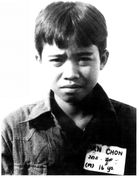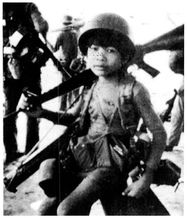“What am I doing in New Hampshire playing soccer?”
Cambodia and New Hampshire, 1970s
The Vietnam War destroyed the homes and shattered the families of many in Vietnam, Cambodia, Thailand, Laos, and other nations of Southeast Asia. Hundreds of thousands of refugees found their way to the United States in the 1970s and 1980s. Like immigrants before them, they struggled to learn English and adjust to a confusing new life. Arn Chorn was a quiet, musical boy of eight when soldiers from a brutal army called the Khmer Rouge took control of Cambodia in 1975. They enslaved him and fed him so little that he survived mainly on frogs and other animals he could catch. Four years later, when Vietnamese soldiers arrived to take on the Khmer Rouge, Arn was given a machine gun and forced into combat. A year later, so sick of killing that he was willing to risk his own life, he deserted. Arn Chorn’s long journey to the United States began with a single step backward into the jungle.
In a war you have to shoot or be shot. Sometimes I didn’t know whether I was shooting at a Vietnamese or a Cambodian. I just shot. We were so deep in the jungle we could barely see each other. When I found out I had killed someone I didn’t want to think about what I had done. I would say, ‘No, that couldn’t have been my bullet.’ Finally there came a moment when I couldn’t take it anymore. I had seen enough death. I decided to escape.
“One night, when it was very dark, I simply slipped away into the trees. I took my gun and my hammock. For clothing I had only my black Khmer Rouge outfit, so badly torn it was almost like being naked. I had no shoes.
“I lived in the jungle for six months. Most nights I tied my hammock up between two limbs and slept in the trees. I looked for dry places in the jungle, but so did other animals. Sometimes I would wake to feel a snake crawling across me. Most Cambodian snakes are small and neurotoxic: when they bite you, you die. I made myself be still, and they would pass over me. It was the monkeys that helped me survive. You can hear them miles away. They scream from the tall trees and throw food at each other. A lot of it would hit the ground and I would get it.
Arn Chorn’s official Khmer Rouge identification photo. It says he is sixteen, though he was really much younger. The Khmer Rouge boosted the ages in such photos to defend themselves against charges that they used children as soldiers.

The Khmer Rouge issued guns to their boy soldiers that were almost as big as the children themselves. The first few times Arn Chorn shot his, the impact knocked him backward into the dust.

“I just tried to keep going, following streams, walking in the evening away from the sound of guns. I would tell myself, ‘You will see your mother in another mile. You will see your brother, Arn Chorn. Keep going.’ And then one day I came to a river. I sat on the bank and thought for a while before I decided to cross. But once I was there, I didn’t feel safe under an open sky. For two days I crouched in the field, stuffing myself on corn and sleeping between the rows. On the third day I stood up. A soldier came upon me, and I dropped my gun. He picked me up and carried me in to a refugee camp. I didn’t know it, but I was in Thailand.
“Two years later an American man named Peter Pond who was working in the camp got permission to take me and two other Cambodian boys to the United States. I went to live in a big house in a small town in New Hampshire with Peter and his wife. They adopted me.
“I had terrible nightmares almost every night. I didn’t know where my family was, or if they were even alive. I slept on my bedroom floor because I couldn’t get used to a bed. I still didn’t feel safe. It was very hard for me to believe that I no longer had to hunt for food. At night I would steal down to the refrigerator almost every hour and take food back to my room. I would put bananas under my pillow so I could eat in the safety of the night. I wanted to eat them by myself, like I used to. I would finish the banana and put the peel on the floor. When my new mother would come in in the morning she would see the peels and get angry. I didn’t know to throw things in a trash container.
“School was terrible. Even though I couldn’t speak English, they put me in ninth grade. I had never been to school before, except for a little time at a Buddhist monastery when I was very young. It was so hard to speak English, which was very frustrating, because there were so many things I wanted to say and ask. My English teacher kept wanting me to say ‘TH.’ Well, there is no ‘TH’ in Cambodian. She kept going, ‘TH, TH, pronounce it!’ Finally she asked one time too many and I spat in her face. She sent me to the principal. I was so angry I was shaking.
“For two years I failed every course in high school, but they let me and the two other Cambodian boys stay in school because we were so good at soccer. We took our anger out on the field. We got to the state championship twice, and we were the stars of the team.
“I was worried about my Cambodian family. I couldn’t keep from thinking about the others who were suffering in Cambodia. I wanted to help them. I kept thinking, ‘What am I doing in New Hampshire playing soccer?’ Then one day my adopted dad said to me, ‘If you really want to help more Cambodians come to this country, you have got to speak out.’ So he helped me write a speech, one word at a time on a piece of paper. I memorized it,
word by word. One Sunday I went to my father’s church and I spoke it. It ended, ‘I have many friends in refugee camps. Please help me. Thank you.’
“When I finished the people stood up and started clapping. I looked out at them and said to myself, ‘Hey … this is all right. These people were really listening.’ And I thought that even though I was young, I could move people if I could just learn enough English. I could help. The English teacher I spat on didn’t give up on me. A year and a half after that first speech in church, I was able to write my own speeches and say anything I wanted.”
He later found out that no other member of his family had survived the Khmer Rouge. He continued to learn English and to speak out for Cambodian refugees. In 1984, Arn and his friend Judith Thompson co-founded Children of War, a group that brought young people from war-torn countries together and gave them a chance to tell their stories to large audiences throughout the United States. He currently lives in Massachusetts, where he works with an organization that helps Cambodian immigrants adjust to life in the United States.